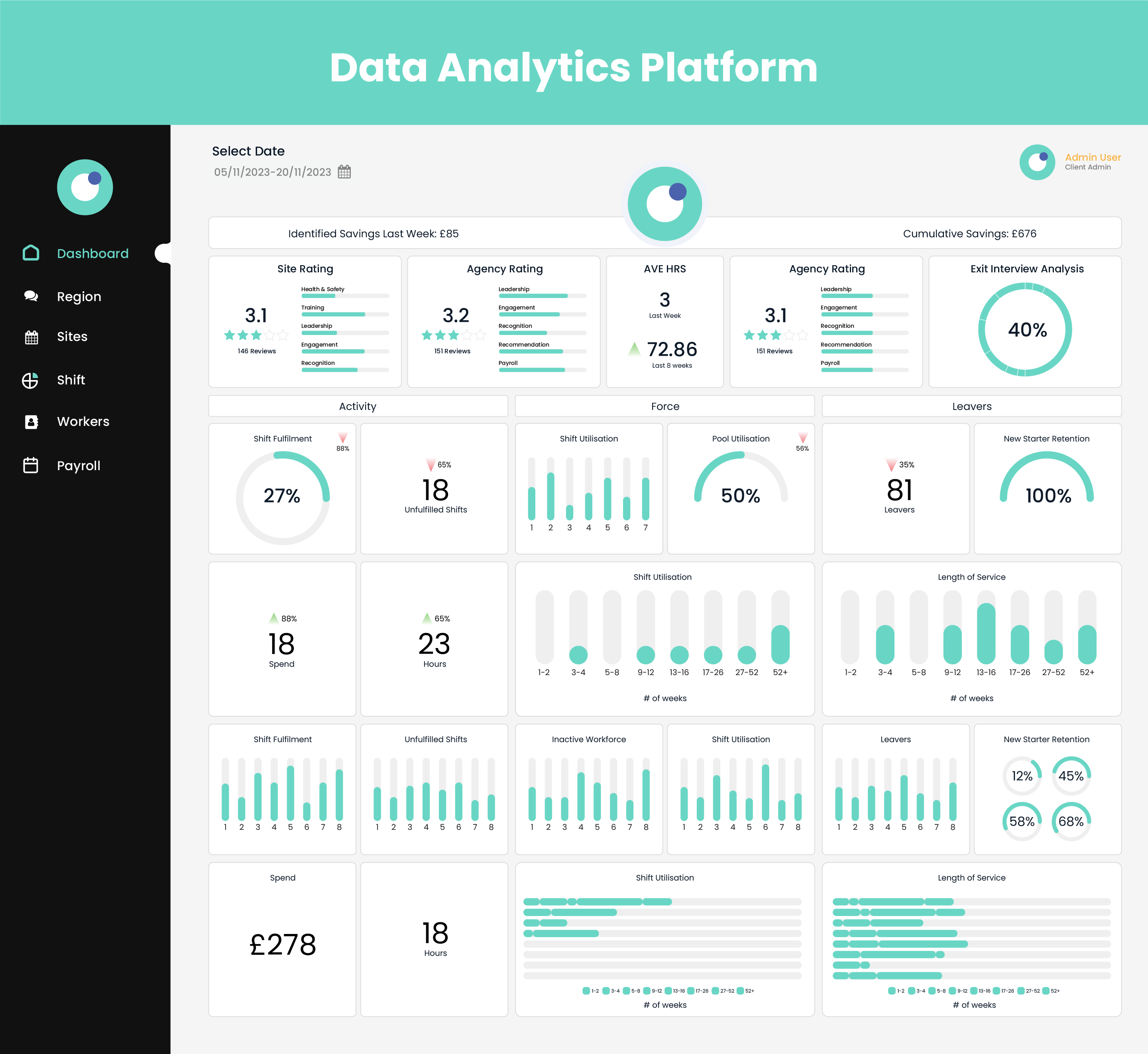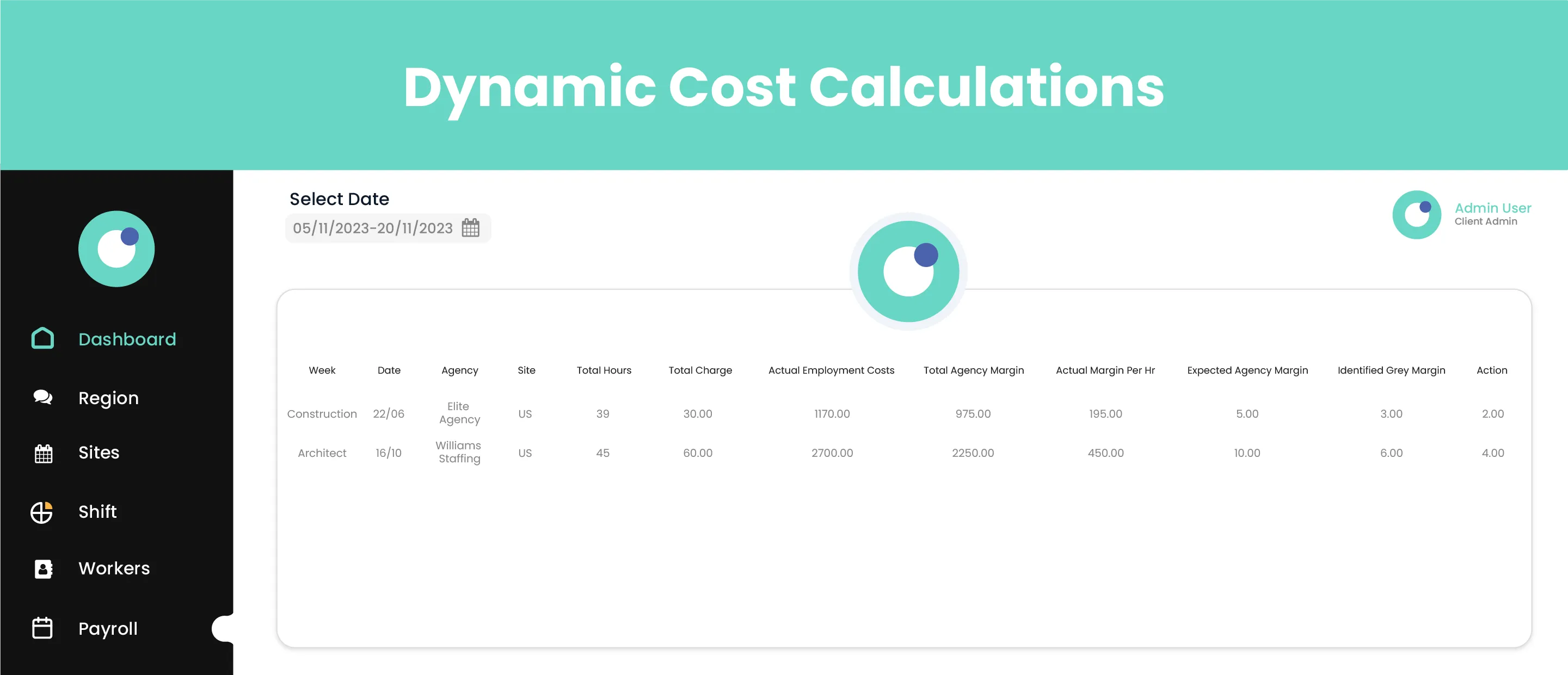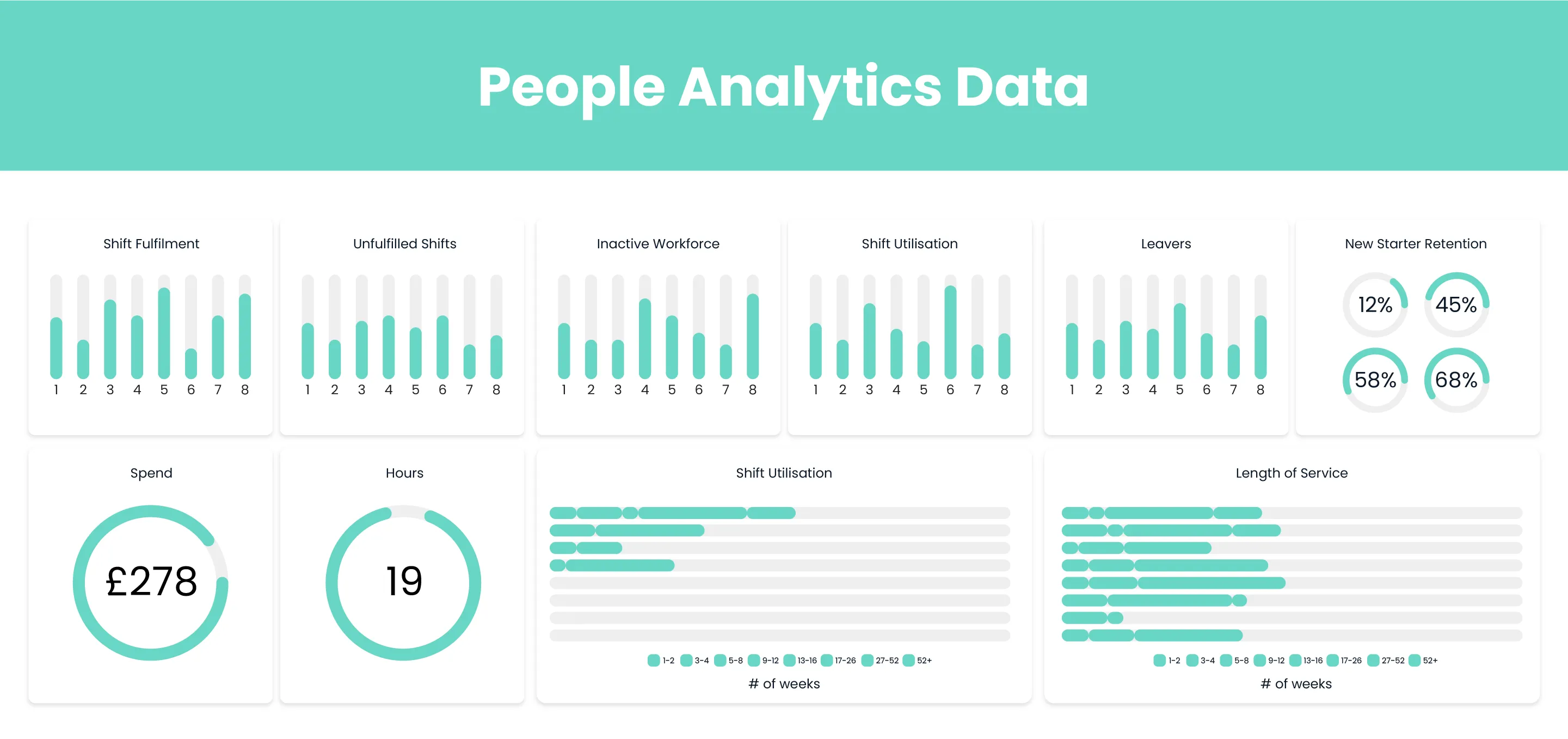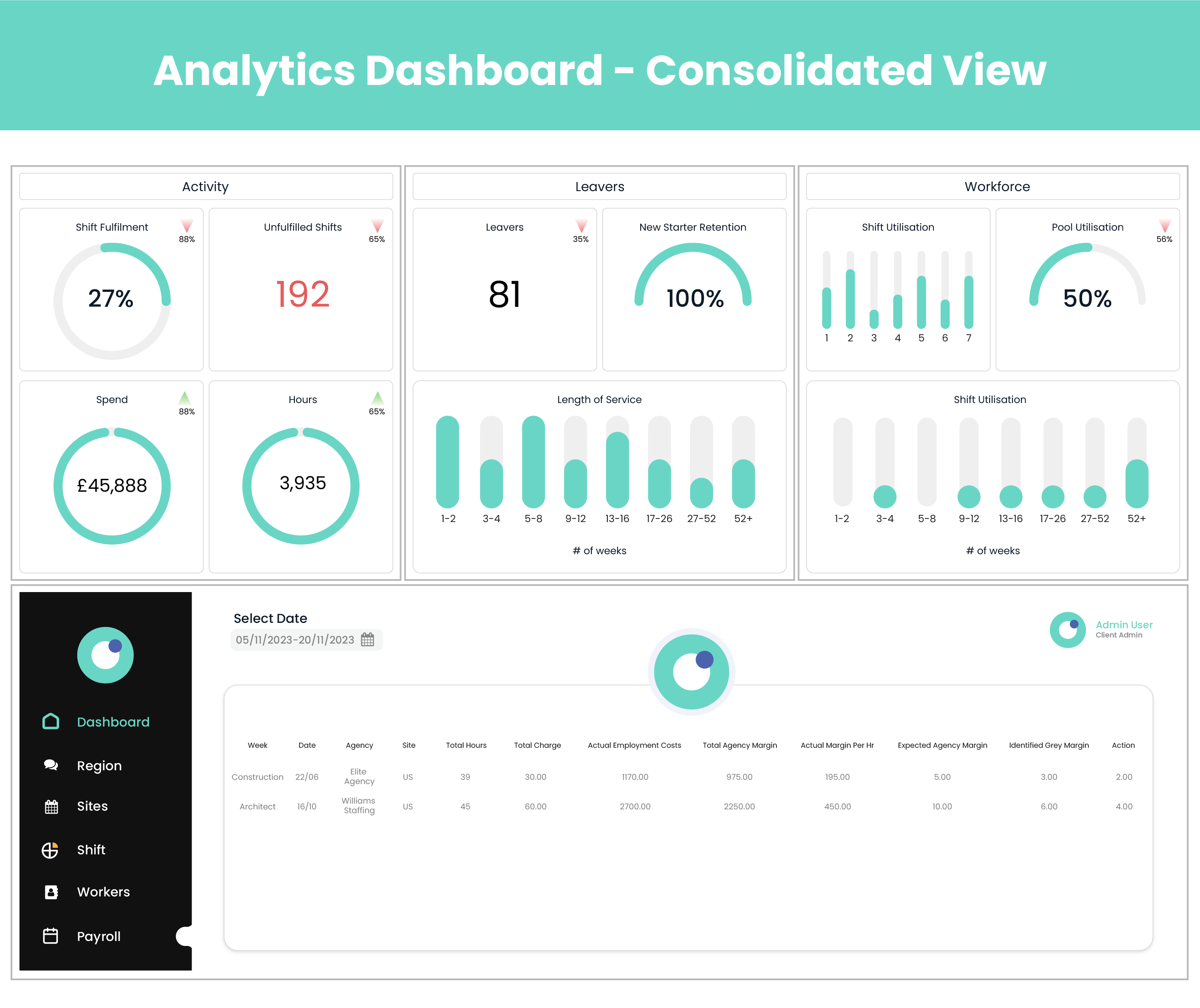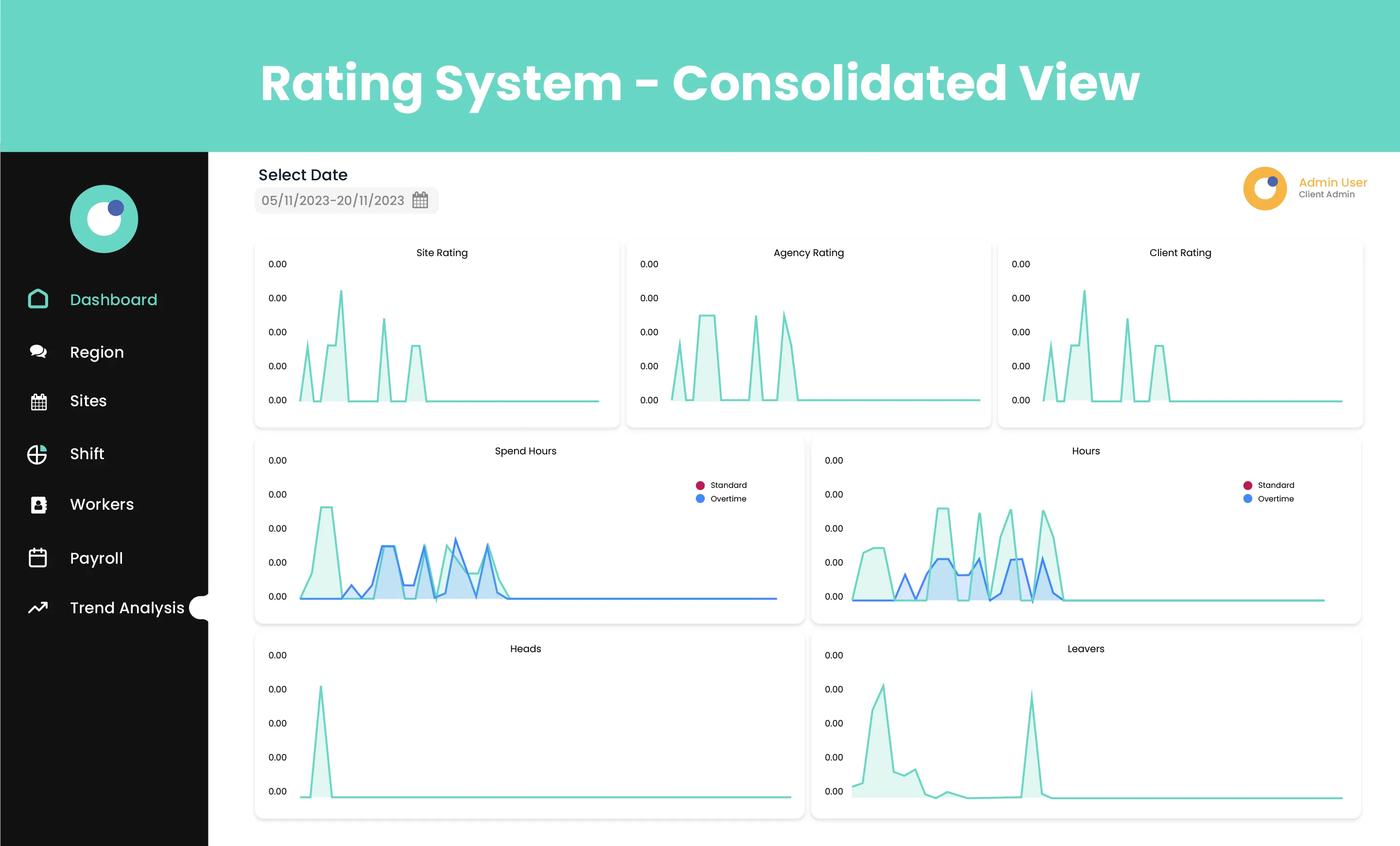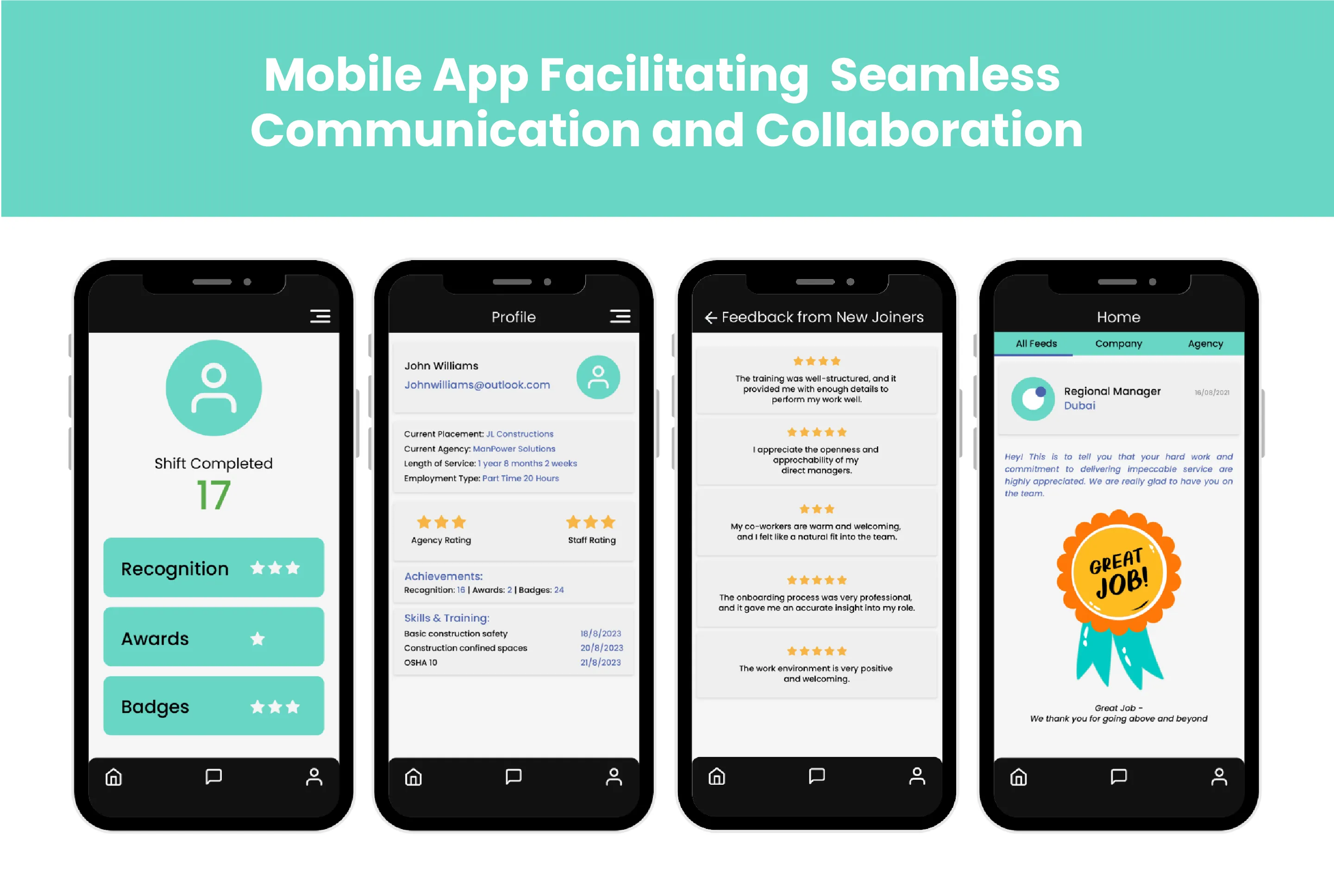and the distribution of digital products.
Building a Data Analytics Platform to Streamline the Temporary Labor Sector
Product Development & QA
IndustryRecruitment
The ClientOur client, a UK-based DaaS (Data-as-a-Service) startup is set on a mission to revolutionize the recruitment space. They launched a centralized platform focused on streamlining cost management, enhancing control, and ensuring compliance across the temporary workforce. This platform serves as a catalyst between agencies, employers, and employees, boosting engagement, transparency, and trust.
The ChallengeTemporary workforces play a substantial role in numerous UK-based businesses, accounting for about 20% to 50% of the total workforce in some organizations. Despite its consistent year-over-year growth, the importance of efficient management of temporary labor is often undervalued.
\ With over 25 years of experience in the recruitment industry, our client had a first-hand understanding of the challenges faced in the temporary staffing industry.
\ A comprehensive analysis revealed that the industry model for temporary staffing was inherently flawed and outdated, lacking transparency and coherence. That's why temporary employees and their employers faced significant issues in collaborating.
Our client sought to address some of the significant challenges -
\ Workforce and Payroll Management Challenges
High attrition rates, subpar employee engagement, and reduced productivity.
Discrepancies between actual billable hourly rates and agency fixed hourly rates. A survey revealed that agency margins could be, on average, 60% higher than the actual costs incurred.
Factors like low average hours, mid-week inductions, and low pension uptake contributed to gray margins, which resulted in employers hugely overpaying the agencies.
Further, as worker hours varied, so did their national insurance (N.I.) and pension costs, which complicated cost calculations.
\
Data Management Challenges
End-hirers lacked access to accurate data regarding their temporary workforce.
Workforce data was often stored across multiple disconnected silos within agencies, requiring manual collation efforts.
Agencies operated in isolation without collaborative data sharing, which increased the risks of overlooking critical issues.
Poor data integrity impaired decision-making, hindering workforce optimization, cost reduction, and business growth.
\
Challenges Faced by Temporary Workforce
Increased labor exploitation, exemplified by prolonged working hours and insufficient break intervals.
Temporary laborers lacked a safe space to voice their concerns or report any issues.
There was no definite platform to facilitate the upskilling of temporary employees.
Poor communication and collaboration between temporary recruits and the core staff posed additional challenges.
\
The client wanted to address the above-mentioned issues by developing a centralized data analytics platform.
SolutionUpon understanding the challenges, it became clear that the temporary recruitment sector required a centralized platform to streamline cost, control, and compliance across the temporary workforce.
\ Furthermore, there was a pressing need to provide temporary workers with an enriched experience, ensuring their operation within a safe and supportive environment that recognized their contributions and valued their input. Consequently, a platform that prioritized employee engagement was essential.
\ The founders shared their vision for such a centralized platform, and Maruti Techlabs brought their idea to fruition by developing an online data analytics platform and an easy-to-use mobile app. To dive deeper, refer to our blog about Data Analytics & Business Intelligence trends for your business.
\ From defining their idea in a 7-day comprehensive workshop to brainstorming the execution maps, our engineering team helped them conceptualize, design, and develop the platform.
\
\ Here's an in-depth look at Maruti Techlabs' approach to executing this project:
\ 1. Project discovery workshop
\ We kicked off with a dynamic discovery workshop. Throughout the 7-day discovery workshop, we explored project requirements and technological insights to create a comprehensive project blueprint. This workshop was pivotal in establishing the project's foundation, fostering a shared understanding between the client and Maruti Techlabs.
\ We used the MoSCoW method to categorize the product features into four distinct levels of importance: Must-Have, Should-Have, Could-Have, and Won't-Have.
\ The 7-day workshop concluded with us developing a detailed blueprint outlining the project's design, development strategy, and roadmap for future progress.
\ 2. Assembling a dedicated software development team
\ Having outlined a well-defined roadmap, we established the architectural design and technology stack. To align with the project's needs, we opted for EC2 (Elastic Compute Cloud) architecture for deployment and RDS (Relational Database Service) for the database.
We chose ReactJS for the front end and NodeJS for the back end and formed a skilled software development team to lead the project to success.
\ Our process of recruiting the development teams revolves around three core principles -
- Past Collaboration: Developers who have worked together in the past foster a smoother team dynamic.
- Skills Match: Developers possessing the precise skills needed to accomplish the project.
- Diverse Expertise: Team with varying experience levels, offering a well-rounded blend of senior and junior talent for a comprehensive perspective.
\ For the smooth execution of this project, we assembled a team consisting of 3 front-end developers, 3 back-end developers, one DevOps engineer, and a QA engineer. This team was guided by a seasoned software architect and managed by an experienced technical project manager.
\ 3. Creating the wireframes
\ After finalizing the high-level project architecture, our team worked on developing the wireframes using Figma. Wireframing helped us outline the system's layout, structure, and functionality.
\ Our technical architects and project engineers collaborated to create data flow diagrams, charts, and sitemaps. This helped us establish a structured representation of the system's logic, processes, and navigation.
\ 4. Developing the application
\ We successfully solidified the structure, logic, and design with client approval in the wireframing phase. Subsequently, our developers commenced the development of an MVP (Minimum Viable Product). The MVP served as a critical first milestone for collecting customer feedback and insights, seamlessly integrated into the subsequent stages of the development cycle.
\ Key features that were a part of the solution -
\
Executing Dynamic Cost Calculations
\
\ The temporary staffing industry is highly transactional. It involves several parameters, including levy, working time regulations (WTR), national insurance (N.I.), and pension, which makes wage calculations complex.
\ We collaborated with the client’s core team to devise mathematical formulas that addressed the high level of complexity while maintaining accuracy in real-time labor cost calculations. These formulas were integrated into the software by our back-end developers, thus enabling end-hirers to calculate dynamic labor costs with a single click.
\
- Developing Customized Dashboards for Data Analytics
Addressing the need for a comprehensive view of temporary workforce data, we engineered a workforce management system fueled by business intelligence. It converted real-time people analytics data into intelligent insights.
\
\ Furthermore, the people analytics dashboards unveiled concealed patterns that proved invaluable in shaping strategic decisions and optimizing the temporary workforce.
\ The dashboards provided a consolidated view of:
Activity Analytics
Workforce Analysis
Leavers Analysis
Agency Analysis
\
\ 1. Activity Analytics
\ We designed a series of custom analytics dashboards that offered comprehensive transparency into critical metrics, such as shift fulfillment, lost shifts, expenditure, and work hours.
\ 2. Workforce Analysis
\ The workforce analysis dashboard we curated provided valuable insights into workforce data like pool and shift utilization. This facilitated the optimization of the temporary workforce.
\ 3. Leavers Analysis
\ We also built a leavers dashboard that helped recruiters uncover hidden patterns in the temporary workforce, fostering more strategic interactions with agency partners.
\ 4. Agency Analysis
\ The agency analysis dashboard helped streamline the process of setting benchmarks and comparing service KPIs across agency panels. This simplified operations and allowed the allocation of resources toward top-performing suppliers.
\
- Creating a Rating System
\ Addressing the need for a fair rating system across the temporary labor industry, we created a simple yet highly effective rating system that enabled employers to rate employees, acknowledge their achievements, and track their performance.
\ The system analyzed the time of the employees' service and created detailed demographic reports. This helped employers make informed hiring decisions and promote collaboration.
\
\
- Developing a Mobile App
\ To facilitate a high-touch employee experience, we developed a mobile app that strongly focuses on user-friendliness. This app facilitated seamless interactions between temporary laborers, core staff, and end-hirers.
\ Employers could now show appreciation to temporary workers for their outstanding work and send personalized messages to celebrate birthdays, service milestones, and achievements. This created an environment where temporary workers felt a sense of belonging, were valued, and had a platform to express their thoughts and opinions.
\
\ Here are some of the critical features of the app:
\
- Employee work detailsTemporary workers can view their total shift completed, awards, badges, and recognitions earned on the app.
- Employee’s digital CVThe app curates a digital CV of temporary employees showcasing their key details like work history, achievements, skills, training, recognition, and award badges. Furthermore, the app can automatically record and update the CV, adding new accomplishments and feats.
- Employee AppreciationTo promote employee engagement and retention, we added a feature in the app that enabled employers and managers to send direct messages appreciating worker’s commitment and delivery.
- Employee FeedbackCreating a safe environment for employees was one of the prime goals of this project. To achieve this, we created an employee feedback feature through which they can rate their experience of the agency and place of work. It further enabled them to anonymously voice their concerns regarding pay disparity, overtime, or other issues.
- Work CommunicationsThe app seamlessly integrates work communications, providing a unified platform for all to connect, interact, and collaborate via message boards or personal messages.
We had monthly governance calls, connecting with their core team over Slack. We also had a fortnightly call involving Maruti Techlabs' leadership, including the CEO, the director, the project manager, and the client team's core members.
\ Our developers embraced the Agile development framework to expedite the software delivery process and adapt to evolving client priorities. Adopting a 2-week sprint cycle, the team collaboratively defined tasks at the beginning of each sprint and worked together to achieve incremental goals. This agile approach facilitated regular feedback and approvals, ensuring continuous alignment between project expectations and execution.
\ The choice of tools also contributed to seamless communication and project management. Jira was employed for effective project management, while Slack served as the primary platform for day-to-day communication and alignment. Zoom calls were integrated into the workflow for regular meetings, including daily stand-ups, sprint retrospectives, and backlog grooming sessions with the client.
\ This structured collaboration ensured that all aspects of the project were well-managed, fostering clear communication and timely responses throughout the development process.
Technology Stack
\
ResultThe implementation of this project resulted in significant transformations across departments. Noteworthy feedback and reviews were received from the following departments -
\
- HR Departments - The application enabled HR teams to speed up their onboarding process, hire suitable candidates, and improve the company's retention rates by making critical employee data like work history, achievements, and employer ratings easily accessible.
- Finance Departments - The application automated temporary workers' wage calculations through real-time tracking of shift hours. It also took into account employment type and variables like pension, National Insurance (NI), and Working Time Regulations (WTR).
- Operations - The application streamlined processes by supporting training, upskilling, and colleague collaboration. It aided in nurturing new talent, increasing engagement, and optimizing the workforce.
- Agency Partners - The application helped agencies deliver unmatched service to their clients by analyzing key employee metrics, optimizing the workforce, placing the perfect candidates, and working on valuable feedback.
- Temporary Colleagues - The multilingual mobile app provided temporary workers a platform where their work was recognized, their feedback was heard, and their issues were resolved proactively.
\ The people analytics dashboards resulted in reduced labor pay-outs by enabling employers to switch from fixed agency rate cards to actual employment costs incurred. It further helped optimize workforce efficiencies and reduce labor costs without any business disruptions.
\ The mobile app enabled employees to share feedback through pulse and regular surveys, resulting in a positive change in work culture, ultimately driving higher retention and employee satisfaction. It supported rich media, image, and video training content and enabled employees to receive quality content in their native language.
\ Concluding this successful collaboration, Maruti Techlabs and the client continue their partnership to enhance the product further based on valuable client feedback. Leveraging our data analytics services, we provide actionable insights to refine the platform, ensuring it meets evolving market demands. Both teams remain in close collaboration, striving towards the shared goal of uplifting the global temporary recruitment sector.
Our Development ProcessWe follow Agile, Lean, & DevOps best practices to create a superior prototype that brings your users’ ideas to fruition through collaboration & rapid execution. Our top priority is quick reaction time & accessibility.
\ We really want to be your extended team, so apart from the regular meetings, you can be sure that each of our team members is one phone call, email, or message away.
\

\
Why Maruti Techlabs?Our client needed a company that could implement complex business logic and create user-centered software products based on an in-depth understanding of their requirements. Maruti Techlabs stood out as the perfect fit.
\ The client initiated vendor selection by scrutinizing several top-tier software development companies, including Maruti Techlabs. Our portfolio, customer references, and relevant experience of building similar platforms helped us secure a place among their carefully curated list of potential vendors.
\ Our prompt response to their Request for Information (RFI) document also left a favorable first impression, and solidified their confidence in our abilities. We competed with eight other vendors and successfully progressed to the Request for Proposal (RFP) stage.
\ A thorough assessment of the RFP responses and extensive consultations with sales, business analysts, and development teams made Maruti Techlabs their top choice. Subsequently, we organized a 7-day discovery workshop to delve deeper into the project specifics.
\ The 7-day discovery workshop left a lasting impression on the client. They comprehensively evaluated our technical understanding, delivery capacity, pricing, and quality.
"Maruti Techlabs scored highly on promptness, proven expertise, technical and business knowledge, team reliability, and the availability of skilled resources."- CTO- Home
- About Us
- Write For Us / Submit Content
- Advertising And Affiliates
- Feeds And Syndication
- Contact Us
- Login
- Privacy
All Rights Reserved. Copyright , Central Coast Communications, Inc.
